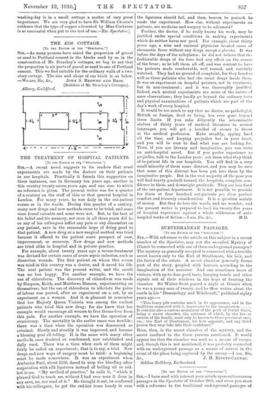THE TREATMENT OF HOSPITAL PATIENTS.
[To THE EDITOR OF TH4 " SPECTATOR."] SIR,—A recent novel suggests to its readers that cruel experiments are made by the doctors on their patients in our hospitals. Practically it founds this suggestion on three instances, one in Germany ten years ago, another in this country twenty-seven years ago, and one case to which no reference is given. The present writer was for a quarter of a century on the staff of this or that general hospital in London. For many years, he was daily in the out-patient rooms or in the wards. During this quarter of a century, many new drugs and new methods came to be tried, and some were found valuable and some were not. But, to the best of his belief and his memory, not once in all those years did he or any of his colleagues inflict any pain or any discomfort on any patient, save in the reasonable hope of doing good to that patient. A new drug or a new surgical method was tried because it offered to the patient some prospect of ease, improvement, or recovery. New drugs and new methods are tried alike in hospital and in private practice.
For example, about twenty years ago a serum-treatment was devised for certain cases of acute septic infection, such as dissection wounds. The first patient--on whom this serum was tried in this country was a doctor, and it saved his life. The next patient was the present writer, and the result was no less happy. For another example, we have the use of chloroform. The discovery of chloroform was made by Simpson, Keith, and Matthews Duncan, experimenting on themselves ; but the use of chloroform to alleviate the pains of labour was proved, after an experiment on a cat, by an experiment on a woman. And it is pleasant to remember that her Majesty Queen Victoria was among the earliest patients who tried this new drug : for she knew that her example would encourage all women to free themselves from this pain. For another example, we have the operation of ovariotomy. The mortality in the earlier cases was terrible ; there was a time when the operation was denounced as criminal. Slowly and steadily it was improved, and became a blessing past all telling. It is the same with many other methods, once doubted or condemned, now established and daily used. There was a time when each of them might fairly be called an experiment ; that is to say, a trial. New drugs and new ways of surgery must be tried : a beginning must be made somewhere. It was an experiment when Ambroise Pare, about 1550, dared to stop the bleeding after amputation with silk ligatures instead of boiling oil or red- hot irons. " My method of practice," he calls it, " which it pleased God to teach me. without I had ever seen it done in any case, no, nor read of it." He thought it out, he conferred with his colleagues, he got the red-hot irons handy in case
the ligatures should fail, and then, heaven be praised, he made the experiment. How else, without experiments on patients, are medicine and surgery to be advanced ?
Further, the doctor, if he really knows his work, may be justified under special conditions in making experiments which do neither harm nor good. For example, about thirty years ago, a wise and eminent physician treated cases of rheumatic fever without any drugs except a placebo. It was before the days of the salicylates ; he did not believe that the fashionable drugs of his time had any effect on the course of the fever ; so lie left them all off, and was content to have his patients made comfortable, well nursed, and carefully watched. They had no ground of complaint, for they fared as well as those patients who had the usual drugs inside them. It was an experiment on hospital patients, not in treatment, but in non-treatment ; and it was thoroughly justified. Indeed, such neutral experiments are more of the nature of mere observations ; they hardly go beyond the ordinary tests and physical examinations of patients which are part of the day's work of every hospital.
It would be too much to say that no doctor, no pathologist, British or foreign, dead or living, has ever gone beyond these limits. If you rake diligently the interminable shelves of thirty years of medical literature in several languages, you will get a handful of stones to throw at the medical profession. Rake steadily, spying hard all the time, and keeping prejudice hot in your heart, and you will be sure to find what you arc looking for. Then, if you are literary and imaginative, you can write an anti-hospital novel. But if you prefer experience to prejudice, talk to the London poor : ask them what they think of in-patient life in our hospitals. You will find in a very small minority of them some distrust, and you may be sure that some of this distrust has been put into them by the imaginative people. But in the vast majority of the poor you will find hearty goodwill toward the hospitals, complete con- fidence in them, and downright gratitude. They are less fond of the out-patient department. It is not possible to provide for three or four hundred out-patients per diem perfect comfort and leisurely consideration. It is a question mainly of money. But they do love the wards, and no wonder; and the present writer is prepared t.o back his twenty-five years of hospital experience against a whole wilderness of anti-
hospital works of fiction.—I am, Sir, &c., M.D.


































































 Previous page
Previous page